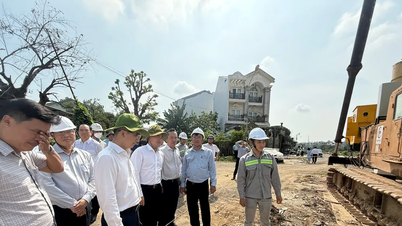Performance management not only helps monitor and evaluate work results but also directly affects employees' income, salary, and promotion opportunities.

The report helps managers grasp challenges and opportunities in building an optimal performance management system, thereby promoting sustainable development - Photo: IceHrm
The 1Academy's 2024 State of Performance Management Report was conducted from a survey of 204 businesses of various industries and sizes.
The report aims to support managers in capturing challenges and opportunities in building an optimal performance management system, thereby promoting sustainable development.
Efficiency is the ability to complete a task or goal in the best possible way without wasting too much resources, time and effort. Meanwhile, performance is related to the level of completion of work or tasks in a certain period of time, meaning that in the same period of time, more work can be completed. These are two concepts that are often confused in business management.
Performance management shapes business development strategy
The report emphasizes three core elements that performance management systems aim for: work performance, work efficiency, and resource efficiency.
This means that the management system not only measures the results achieved, but also evaluates the process and the level of optimization in the use of resources.
According to the report, 75.98% of Vietnamese enterprises have implemented performance management systems, with 72.06% of them applied to all official employees. This is a positive sign that Vietnamese enterprises are gradually grasping modern management trends.
However, 42.16% of businesses still rate this system as only "moderately effective", showing that there is still much untapped potential from modern management tools.
Challenges and opportunities
The survey found that there is a big difference in the application of performance management systems between businesses. Larger businesses, with stronger resources, have been gradually applying international performance management standards.
Meanwhile, small and medium enterprises still face difficulties in optimizing this system due to limitations in finance, resources and technology.
Notably, nearly 80% of businesses have established detailed action plans based on goals approved by senior management, ensuring alignment with the overall strategy.
However, only 32.84% of businesses apply a synchronous plan at all levels, from the company to departments and individuals, showing a lack of consistency in implementation.
The relationship between performance management and sustainable development
The report found that 88% of businesses recognized that performance has a direct impact on employee earnings, with 24.02% reporting an impact exceeding 50%. This demonstrates that performance measurement is not only a management tool but also an important determinant of compensation and benefits policies.
In terms of performance evaluation frequency, the report shows that there are differences between industries. Retail and service businesses often conduct monthly evaluations (28.92%), while traditional industries such as construction and real estate often conduct annual evaluations (23.04%). This clearly reflects the need for each industry to monitor and adjust performance to suit the speed and characteristics of the business environment.
What should businesses do to better manage performance?
One of the notable findings of the report is that many Vietnamese businesses have yet to fully utilize the potential of performance management systems. Building a transparent corporate culture, promoting continuous feedback and training managers in coaching skills are key to improving performance management effectiveness.
The report also recommends that businesses invest in dedicated performance management software, rather than relying on basic tools such as Microsoft Excel or Google Sheets, which only partially meet the needs. Automation and data integration will help improve the accuracy of information collection and analysis, thereby supporting businesses to make timely and more effective decisions.
In addition, the performance-based reward system needs to be built in a diverse way, combining both financial factors (such as quarterly and annual bonuses) and non-financial factors (such as recognition of achievements and promotions), to create long-term motivation for employees.
Source: https://tuoitre.vn/co-quan-quan-tri-hieu-suat-hieu-qua-nhan-vien-moi-hi-vong-tang-luong-20241016204056987.htm



![[Photo] Panorama of the cable-stayed bridge, the final bottleneck of the Ben Luc-Long Thanh expressway](https://vphoto.vietnam.vn/thumb/1200x675/vietnam/resource/IMAGE/2025/9/30/391fdf21025541d6b2f092e49a17243f)
![[Photo] General Secretary To Lam, Secretary of the Central Military Commission attends the 12th Party Congress of the Army](https://vphoto.vietnam.vn/thumb/1200x675/vietnam/resource/IMAGE/2025/9/30/9b63aaa37ddb472ead84e3870a8ae825)
![[Photo] Solemn opening of the 12th Military Party Congress for the 2025-2030 term](https://vphoto.vietnam.vn/thumb/1200x675/vietnam/resource/IMAGE/2025/9/30/2cd383b3130d41a1a4b5ace0d5eb989d)
![[Photo] The 1st Congress of Phu Tho Provincial Party Committee, term 2025-2030](https://vphoto.vietnam.vn/thumb/1200x675/vietnam/resource/IMAGE/2025/9/30/1507da06216649bba8a1ce6251816820)
![[Photo] President Luong Cuong receives President of the Cuban National Assembly Esteban Lazo Hernandez](https://vphoto.vietnam.vn/thumb/1200x675/vietnam/resource/IMAGE/2025/9/30/4d38932911c24f6ea1936252bd5427fa)





























































































Comment (0)